Rosie O'Donnell on Life, Love and Family

Comedian Rosie O'Donnell was once known as the "Queen of Nice." For six seasons, she was the Emmy-winning host of The Rosie O'Donnell Show, an instant hit that catapulted her from the standup stage to stardom.
In a surprising move, Rosie ended her show in 2002 to spend more time with her family. Since then, she's traded in the "nice" title for something more authentic and, oftentimes, more controversial.
The same year her show went off the air, Rosie came out publicly as a lesbian, and in 2004, she married longtime partner Kelli Carpenter in San Francisco. Their marriage was later annulled by the State of California.
Rosie took time out of the spotlight to stay home with her and Kelli's four children, Parker, Chelsea, Blake and Vivienne, before returning to daytime television. When a spot opened up on The View, Rosie settled in as one of the outspoken co-hosts. Ratings soared...and so did tempers.
After a private argument with the show's creator, TV legend Barbara Walters, and a heated, on-air debate with co-host Elisabeth Hasselbeck, Rosie walked off the set in May 2007, never to return.
In a surprising move, Rosie ended her show in 2002 to spend more time with her family. Since then, she's traded in the "nice" title for something more authentic and, oftentimes, more controversial.
The same year her show went off the air, Rosie came out publicly as a lesbian, and in 2004, she married longtime partner Kelli Carpenter in San Francisco. Their marriage was later annulled by the State of California.
Rosie took time out of the spotlight to stay home with her and Kelli's four children, Parker, Chelsea, Blake and Vivienne, before returning to daytime television. When a spot opened up on The View, Rosie settled in as one of the outspoken co-hosts. Ratings soared...and so did tempers.
After a private argument with the show's creator, TV legend Barbara Walters, and a heated, on-air debate with co-host Elisabeth Hasselbeck, Rosie walked off the set in May 2007, never to return.
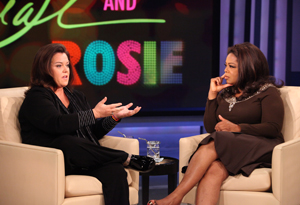
For the first time in 13 years, Rosie returns to The Oprah Show to reflect on love, life and the ever-evolving definition of family. Since she walked off The View, Rosie says she's been at home, trying to figure out what to do with the second chapter of her life.
"I think as a child I never thought I would live past 40, because my mother didn't," she says. "And my goal was to do everything I could before I was 40 and then retire and wait for the doctor to say, 'Well, you're going to die.'"
When that didn't happen, this 47-year-old mother of four began to look inward. Like many women, Rosie says she wanted to find a way to balance work and family.
Rosie also wanted to live a more authentic life, which she says led her to make the most difficult decision of her adult life. In 2007, she quietly separated from Kelli.
"I think as a child I never thought I would live past 40, because my mother didn't," she says. "And my goal was to do everything I could before I was 40 and then retire and wait for the doctor to say, 'Well, you're going to die.'"
When that didn't happen, this 47-year-old mother of four began to look inward. Like many women, Rosie says she wanted to find a way to balance work and family.
Rosie also wanted to live a more authentic life, which she says led her to make the most difficult decision of her adult life. In 2007, she quietly separated from Kelli.
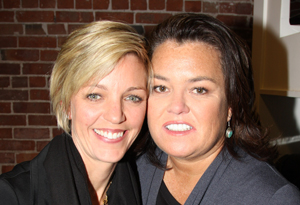
Photo: Bruce Glikas/Getty Images
By the time the story broke in October 2009, Rosie and Kelli had been living apart for almost two years. Even after Kelli moved out, Rosie says they tried to save their relationship.
"We tried very hard to make it work in different configurations and to try to stay together and allow each other to grow and evolve and find joy," she says.
Now, Rosie considers herself divorced from Kelli, though they didn't have to go through legal proceedings. But, even after a breakup, Rosie says most lesbian couples stay connected. "It sounds maybe a little bit elitist, and I'm not trying to say it's better. I just think it's a different paradigm," she says. "[For] women, usually in relationships, the emotional connection is really the most intense, and so when they break up, I have found they stay connected. Every woman that I have ever been with, besides one, is still in my life."
Rosie says she wasn't unhappy with Kelli, but as she got older, she realized how different they were.
"I think that what you want and need at 30, which is when I met Kelli—I was 35—is very different than what you want and need at 40 and 45," she says. "I think, in some ways, we both came back to our authentic selves. And who we were authentically wasn't as great of a match as who we were when we met in the midst of my show and fame and in the midst of her big career at Nickelodeon."
Rosie says she spent the first half of their relationship doing her talk show, and after she quit, things changed. She spent more time alone, and realized she and Kelli needed to find more joy in their lives. "The joy we did find was with our children, but not necessarily with each other, or within our own life separate, as adult women," she says.
"We tried very hard to make it work in different configurations and to try to stay together and allow each other to grow and evolve and find joy," she says.
Now, Rosie considers herself divorced from Kelli, though they didn't have to go through legal proceedings. But, even after a breakup, Rosie says most lesbian couples stay connected. "It sounds maybe a little bit elitist, and I'm not trying to say it's better. I just think it's a different paradigm," she says. "[For] women, usually in relationships, the emotional connection is really the most intense, and so when they break up, I have found they stay connected. Every woman that I have ever been with, besides one, is still in my life."
Rosie says she wasn't unhappy with Kelli, but as she got older, she realized how different they were.
"I think that what you want and need at 30, which is when I met Kelli—I was 35—is very different than what you want and need at 40 and 45," she says. "I think, in some ways, we both came back to our authentic selves. And who we were authentically wasn't as great of a match as who we were when we met in the midst of my show and fame and in the midst of her big career at Nickelodeon."
Rosie says she spent the first half of their relationship doing her talk show, and after she quit, things changed. She spent more time alone, and realized she and Kelli needed to find more joy in their lives. "The joy we did find was with our children, but not necessarily with each other, or within our own life separate, as adult women," she says.
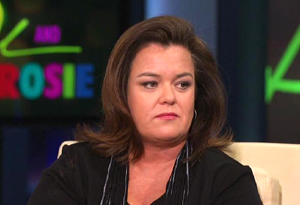
As one of the most famous lesbians in the world and a vocal proponent of gay marriage, Rosie says she did feel unspoken pressure to stay with Kelli and be a role model for other gay couples.
"I remember when Melissa [Etheridge] and Julie broke up, I called Melissa and said: 'Come on. There's so few,'" Rosie says. "And she said, 'Ro, your first goal in life is to be true to yourself, and your children will look at you and know when you're living an authentic life.'"
Rosie says this resonated with her, and from then on, she approached her divorce with honesty. "I wanted to show people that gay families are just like every other family, and sometimes, divorce happens," she says. "No one ever goes into a marriage expecting or wanting a divorce."
While Rosie can now look back at this time in her life reflectively, it wasn't easy to get to this place. "It was a difficult thing to get through," she says. "I have to say it was the most difficult thing in my adult life."
"I remember when Melissa [Etheridge] and Julie broke up, I called Melissa and said: 'Come on. There's so few,'" Rosie says. "And she said, 'Ro, your first goal in life is to be true to yourself, and your children will look at you and know when you're living an authentic life.'"
Rosie says this resonated with her, and from then on, she approached her divorce with honesty. "I wanted to show people that gay families are just like every other family, and sometimes, divorce happens," she says. "No one ever goes into a marriage expecting or wanting a divorce."
While Rosie can now look back at this time in her life reflectively, it wasn't easy to get to this place. "It was a difficult thing to get through," she says. "I have to say it was the most difficult thing in my adult life."
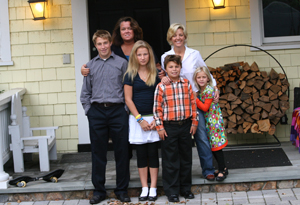
Today, Rosie says Kelli still lives near her home in upstate New York, and they come together for the big events in their kids' lives, like the first day of school. But, Rosie says the decision to co-parent the children was very upsetting at first.
"My desire, always, my whole life was to be a mother—and a full-time mother," she says. "It was not to not live with them."
One night, Rosie says she was crying in her room when her oldest son, 14-year-old Parker, came in to see what was wrong. "He's like, 'What's up, Mom?' And I was like, 'I can't imagine that you're not going to be here, and I'm just going to miss you so much.' And he said: 'Mom, I'm always going to be your son. It doesn't matter where I am. You're okay. I love you. We're connected. It's all right,'" she says. "He's like my little Yoda."
Now, Rosie says she and Kelli have found a free-flowing way to share equal time with their children without really ever being without them.
"My desire, always, my whole life was to be a mother—and a full-time mother," she says. "It was not to not live with them."
One night, Rosie says she was crying in her room when her oldest son, 14-year-old Parker, came in to see what was wrong. "He's like, 'What's up, Mom?' And I was like, 'I can't imagine that you're not going to be here, and I'm just going to miss you so much.' And he said: 'Mom, I'm always going to be your son. It doesn't matter where I am. You're okay. I love you. We're connected. It's all right,'" she says. "He's like my little Yoda."
Now, Rosie says she and Kelli have found a free-flowing way to share equal time with their children without really ever being without them.
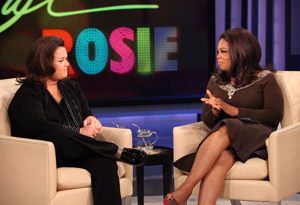
Though Rosie says she's always wanted to be a mom, she was fearful of what would happen once her children reached age 10—the age she was when her mother died. "For a long time, I had been telling myself: 'Well, I was not parented after the age of 10. I'm not going to know what to do when they get older than 10,'" she says.
Looking back, Rosie realizes she's been wrong all along. After her mother died and her father was too grief-stricken to care for his children, Rosie says women who lived in her Long Island neighborhood stepped in as surrogate mothers.
"I was raised with love, compassion and grace by women who were not connected to me by biological means, and that's exactly what I ended up doing," she says.
From age 10 until her freshman year in college, Rosie says she never spoke of her mother's death. In response, Rosie's parenting style is the opposite of her father's. In her home, every child is encouraged to share his or her feelings. "In fact, it's to the point that it almost annoys my children now," she says. "I'm constantly saying: 'Are you okay? What are you feeling? Can we talk?'"
Looking back, Rosie realizes she's been wrong all along. After her mother died and her father was too grief-stricken to care for his children, Rosie says women who lived in her Long Island neighborhood stepped in as surrogate mothers.
"I was raised with love, compassion and grace by women who were not connected to me by biological means, and that's exactly what I ended up doing," she says.
From age 10 until her freshman year in college, Rosie says she never spoke of her mother's death. In response, Rosie's parenting style is the opposite of her father's. In her home, every child is encouraged to share his or her feelings. "In fact, it's to the point that it almost annoys my children now," she says. "I'm constantly saying: 'Are you okay? What are you feeling? Can we talk?'"
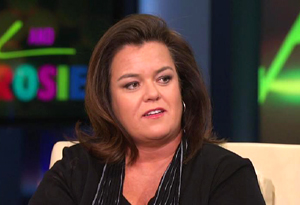
Even though she and Kelli are no longer a couple, Rosie says she wants her children to know that family is forever.
"[I want them to know] they can survive challenges, even unexpected ones that are terrifically sad," she says. "And that change is inevitable, and you can always survive it. ... There is always something new in the future, and you don't know what it's going to be, but it's got the potential for tremendous joy."
To celebrate families of all kinds, Rosie interviewed dozens of children—including her own—for the HBO documentary A Family is a Family is a Family: A Rosie O'Donnell Celebration.
In one scene, Rosie talks with her youngest daughter, Vivienne, about her separation from "mommy Kelli" and the importance of family. "We need families so that we have people to take care of us and people we can take care of, and so that we can learn what it means to love all the way," she tells her daughter. "You have to know that families are forever. That means, no matter what happens, no matter what you do, your family is always going to be there for you to help you and to love you."
"[I want them to know] they can survive challenges, even unexpected ones that are terrifically sad," she says. "And that change is inevitable, and you can always survive it. ... There is always something new in the future, and you don't know what it's going to be, but it's got the potential for tremendous joy."
To celebrate families of all kinds, Rosie interviewed dozens of children—including her own—for the HBO documentary A Family is a Family is a Family: A Rosie O'Donnell Celebration.
In one scene, Rosie talks with her youngest daughter, Vivienne, about her separation from "mommy Kelli" and the importance of family. "We need families so that we have people to take care of us and people we can take care of, and so that we can learn what it means to love all the way," she tells her daughter. "You have to know that families are forever. That means, no matter what happens, no matter what you do, your family is always going to be there for you to help you and to love you."
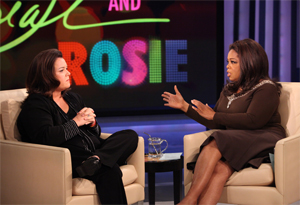
Rosie is finding more joy in her private life, but her last day at The View is still the most-discussed moment of her professional life.
In case you missed it, Rosie and Elisabeth got into a heated political debate on live television about the war in Iraq. Previously, Rosie had made controversial comments about America's involvement, and when critics called her "un-American" in the media, she hoped Elisabeth would defend her. She did not.
"We had a friendship in some capacity, and there's something about somebody being different on TV toward you than they are in the dressing room. It didn't really ring true for me," she says. "I just felt it was a betrayal of my friendship, and what you saw there was my hurt feelings."
But her argument with Elisabeth wasn't why she left the show after that day. "I didn't come back because the director and the producer did a split screen, and they had to prepare that in advance. I knew that because I was the producer of my own television show," she says. "I felt there was a little bit of a setup involved in egging me into that position."
After just a few months on The View, Rosie says she knew it wasn't the right fit. "I didn't want to argue for a living," she says. "It was not my show, and I didn't have the control that I was used to. ... And the executive producer and I did not gel."
There were some aspects of the show she did enjoy. "I loved being back in the arena with people. I loved being able to say on television what people were not saying at that time," she says.
In case you missed it, Rosie and Elisabeth got into a heated political debate on live television about the war in Iraq. Previously, Rosie had made controversial comments about America's involvement, and when critics called her "un-American" in the media, she hoped Elisabeth would defend her. She did not.
"We had a friendship in some capacity, and there's something about somebody being different on TV toward you than they are in the dressing room. It didn't really ring true for me," she says. "I just felt it was a betrayal of my friendship, and what you saw there was my hurt feelings."
But her argument with Elisabeth wasn't why she left the show after that day. "I didn't come back because the director and the producer did a split screen, and they had to prepare that in advance. I knew that because I was the producer of my own television show," she says. "I felt there was a little bit of a setup involved in egging me into that position."
After just a few months on The View, Rosie says she knew it wasn't the right fit. "I didn't want to argue for a living," she says. "It was not my show, and I didn't have the control that I was used to. ... And the executive producer and I did not gel."
There were some aspects of the show she did enjoy. "I loved being back in the arena with people. I loved being able to say on television what people were not saying at that time," she says.

Rosie's last day wasn't her only controversial moment on The View. During one discussion, Rosie criticized business mogul Donald Trump, which sparked a vicious back-and-forth in the media.
The show's leading lady, Barbara, got caught in the middle. Barbara, a social acquaintance of Donald's, said Rosie didn't feel like she defended her enough. This led to a confrontation in The View's dressing room, which Barbara described during a 2008 Oprah Show interview as Rosie's worst day, emotionally.
Rosie describes the moment in her book, Celebrity Detox. She writes: "I stood up. I tell people I love, I've always told people if you ever are in a fight with me and I stand up, leave the room. Not because I'm going to hit you. I've never hit a person. I've never worried that I would. But if I stand up, that's a sign that the rage is too big for my body. I have to move to readjust the rage and the pressure of the past."
Overcome with rage, Rosie says she yelled hurtful things at Barbara, which she now regrets. "What's really, really regretful for me is that I think I scared her," she says. "I actually do love her and care about her, but I did scare her that day. Because, you know, I'm 200 pounds. When I stand up, and I go right in your face and say: 'What is wrong with you? Do you not have a human heart?' It's crazy."
Instead of using her words as weapons, Rosie says if she'd been braver, she would have cried and told Barbara she hurt her feelings. "The authentic feeling that I had was pain and hurt and rejection," she says. "I have a lot of emotions and I express them, and I'm lucky that I'm in a business where I get paid to do that. Sometimes, though, they overwhelm me. Sometimes I get flooded."
The show's leading lady, Barbara, got caught in the middle. Barbara, a social acquaintance of Donald's, said Rosie didn't feel like she defended her enough. This led to a confrontation in The View's dressing room, which Barbara described during a 2008 Oprah Show interview as Rosie's worst day, emotionally.
Rosie describes the moment in her book, Celebrity Detox. She writes: "I stood up. I tell people I love, I've always told people if you ever are in a fight with me and I stand up, leave the room. Not because I'm going to hit you. I've never hit a person. I've never worried that I would. But if I stand up, that's a sign that the rage is too big for my body. I have to move to readjust the rage and the pressure of the past."
Overcome with rage, Rosie says she yelled hurtful things at Barbara, which she now regrets. "What's really, really regretful for me is that I think I scared her," she says. "I actually do love her and care about her, but I did scare her that day. Because, you know, I'm 200 pounds. When I stand up, and I go right in your face and say: 'What is wrong with you? Do you not have a human heart?' It's crazy."
Instead of using her words as weapons, Rosie says if she'd been braver, she would have cried and told Barbara she hurt her feelings. "The authentic feeling that I had was pain and hurt and rejection," she says. "I have a lot of emotions and I express them, and I'm lucky that I'm in a business where I get paid to do that. Sometimes, though, they overwhelm me. Sometimes I get flooded."
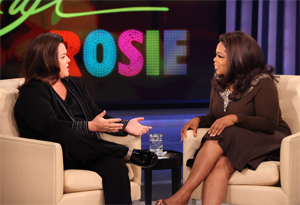
Time has helped Rosie heal and deal with her rage.
"It took real kind of self-acceptance, and it took understanding that you don't have to live that way. You have a choice to live half empty, half full. It's a simple analogy," she says. "Every time I teach it to [my kids], I reteach it to myself. I've had an amazing life, and to constantly think of the times when it was not so amazing really robs me of the joy of the good parts."
When Rosie is feeling down, she thinks of a line from a movie that she says changed her life—the animated film Kung Fu Panda. "The message is profound," she says. "The little Yoda character says, 'Now is a gift, and that's why it's called the present.'"
Watch as Rosie sums up her life in song
Why Rosie meditates every day
"It took real kind of self-acceptance, and it took understanding that you don't have to live that way. You have a choice to live half empty, half full. It's a simple analogy," she says. "Every time I teach it to [my kids], I reteach it to myself. I've had an amazing life, and to constantly think of the times when it was not so amazing really robs me of the joy of the good parts."
When Rosie is feeling down, she thinks of a line from a movie that she says changed her life—the animated film Kung Fu Panda. "The message is profound," she says. "The little Yoda character says, 'Now is a gift, and that's why it's called the present.'"
Watch as Rosie sums up her life in song
Why Rosie meditates every day



